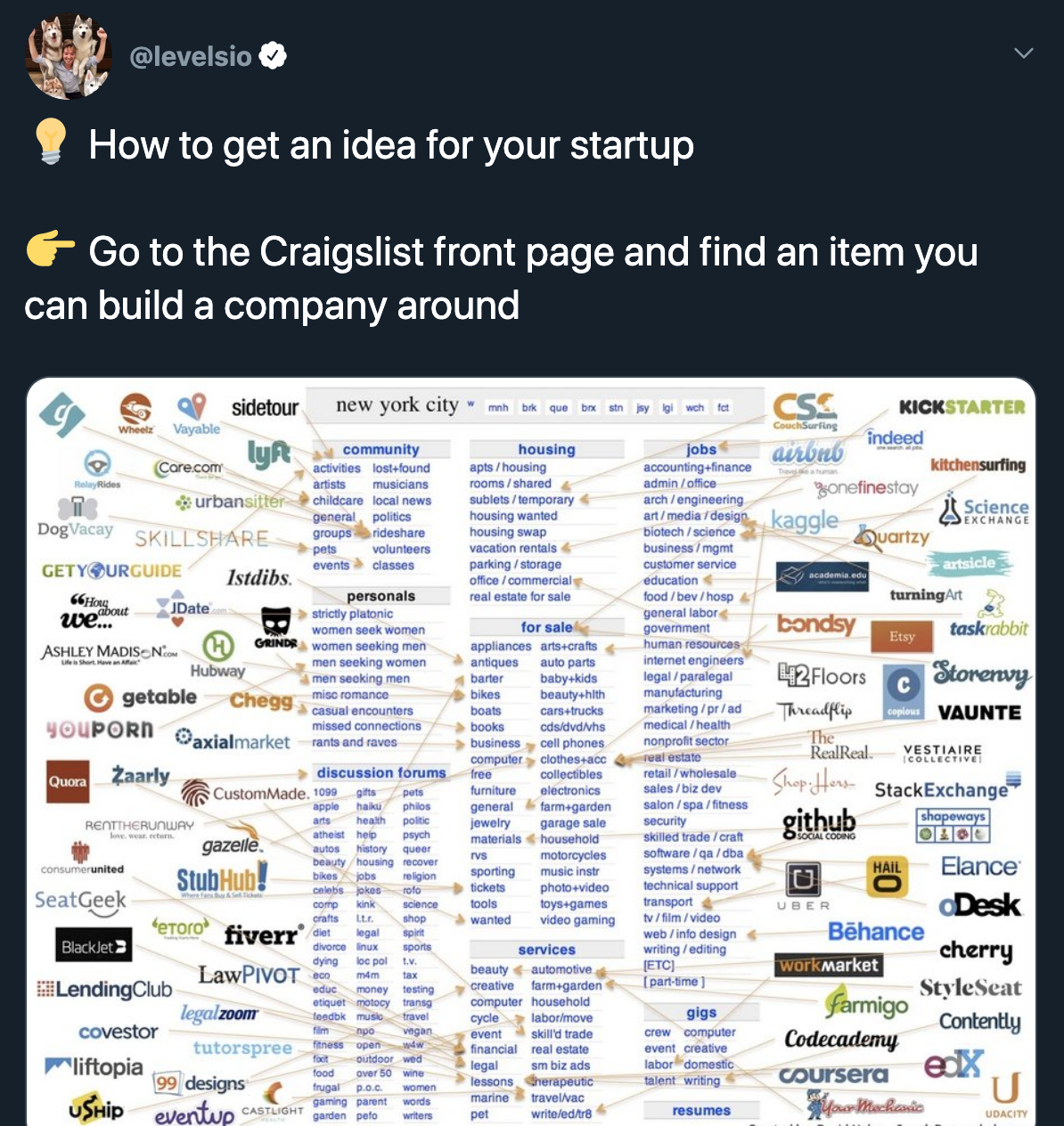My favorite posts on finding startup ideas
Ideas capture our minds and hearts.
As entrepreneurs, we all start out dreaming of that lightbulb moment. The moment where we find the perfect idea. An idea so enticing, we gladly devote 10 years of our life to cracking it, mastering it, bringing it to life. An idea that causes brilliant minds to flock to us, to follow us into the uncharted territory.
At times it feels like you have no good ideas, you feel stuck in a rut. Then there are the days where you're consumed with one idea after another. If only you could decide which path to follow.
Eventually you realize that ideas aren't everything. Execution matters certainly. Timing and luck play a huge role in any startup's success.
But you still pay attention. Watching trends, keeping an ear to the ground.
So how much are ideas really worth?
How do you go about finding new ideas?
What do good ideas and bad ideas look like?
These are the questions I'm going to try to answer in this first Collection.
What's a Collection?
There's a lot of great startup content out there already. But it can be hard to find all the best content when you need it most.
I do hours of research to find the absolute best content the internet has to offer on specific topics. Then I wrap it up in a tidy package so you can find everything you need in one place.
No bull shit allowed. Insightful, actionable content from people who know what they're talking about.
What makes the cut?
For content to make it in a collection it needs to be:
- Specific
- Insightful
- Engaging
- From a reputable source
The content can come in any form, and I'll only include it if I personally found it valuable.
A couple of notes:
I'm going to treat this as a living document. I'll keep it on my website and continue to add to it as I come across content that could make it better.
Also shout-out to Holloway Syllabi for giving me some inspiration on how to format this. It's something I've wanted to do for a while, and see their syllabi finally pushed me to try.
Do ideas matter?
We talk about them all the time, but what are ideas really worth?
- Ideas are multipliers (they aren't worth anything without execution) - Derek Sivers
- Ideas are almost everything - Justin Mares
- Your idea sucks now go do it anyway - Jason Cohen
- Building a lucrative business with no ideas - Dane Maxwell on the Smart Passive Income podcast
Generating startup ideas
The consensus amongst most experts is that you should start by finding painful problems to solve. You can find these problems by talking to potential customers.
It also helps to practice, unsurprisingly. Generate as many bad ideas as you can, and try to take the pressure out of the equation.
- Finding ideas for your next project through idea extraction (a fancy name for customer interviews) - Nathan Barry
- How to get startup ideas (start with a problem) - Paul Graham
- Where do ideas come from - Seth Goden
- How to interview customers - Justin Wilcox
- Brainstorming: how to generate new ideas (a psychology perspective) - Anne-Laure Le Cunff

- Finding ideas by talking to people - Julie Zhou
- Finding ideas by observing people in their natural habitat (sales safari) - Amy Hoy
Ideas vs markets
There's a growing movement, especially in the bootstrapped startup community, that feels we've put too much emphasis on ideas and products. Instead of focusing on finding a problem, founders should find a growing market who they're passionate about helping. The market should be easy to reach and have enough money to support your business.
- The wrong way to find a SaaS idea (start with a market instead) - Amy Hoy
- The magic of choosing a great market - Justin Jackson on the Indie Hackers podcast
- Who you want to help > what you want to build - Adam Wathan and Justin Jackson
- How to pick your customer segment - Justin Wilcox
NDAs and sharing your idea
Regardless of whether ideas are important or not, everyone agrees that you don't need to worry about someone stealing yours. Just try giving an idea away some time and see how it goes.
- Why your code and ideas should be public - Derek Sivers
- Sharing progress in public - Justin Jackson
What makes a good idea?
The ultimate question. How do you tell if an idea is worth pursuing? Some of these articles may cross over into validation, but I'll be creating a follow-up collection devoted solely to that topic.
- Why most product ideas aren't that good - Justin Jackson
- The best ideas initially look like bad ideas - Paul Graham
- Exploring ideas and exploiting the good ones - Justin Mares on the Indie Hackers podcast
- How to pick a business idea that won't make you miserable - Amy Hoy
- Idea validation checklist - Courtland Allen
- Startup idea checklist - Slava Akhmechet
- The importance of founder/market fit - Taylor Pearson
- When are you done interviewing customers - Justin Wilcox
- What to work on - Julian Shapiro
Aim for quantity
There's a valid argument to be made that the only true way to find a good startup idea is to get lucky. So how do you increase your odds of getting lucky? Enter the raffle as many times as possible.
- Working on 50+ projects over 15 years - Josh Pigford
- Turning side projects into profitable startups - Pieter Levels
- Starting 23 businesses - Danielle Baskin on the Indie Hackers podcast
